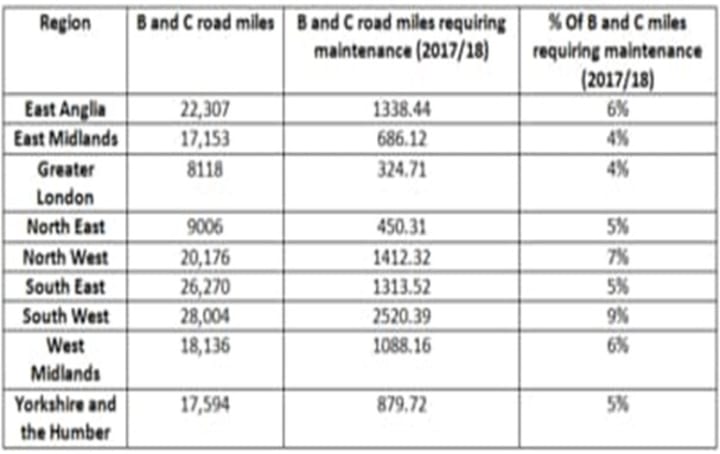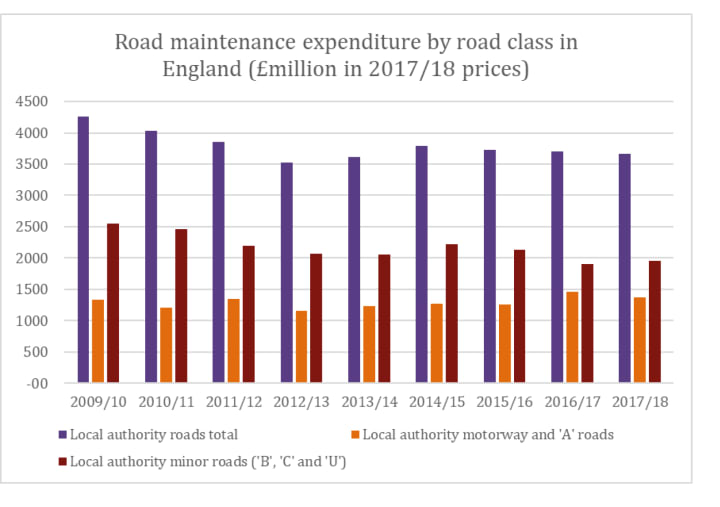The Menace On The Roads - Car Wheels Watch Out!
The Pothole Nightmare Continues...

Ah yes, those lovely shapely holes...
But perhaps there are some sadists out there who do like them. Maybe even get a kick out of having to spend ridiculous exorbitant hard-earned cash on replacing damaged tyres?
Still, if like me today, you do have a damaged tyre that requires replacing and fitting, then what's your option - what caused the damaged tyre then?
I can hear you all shouting at your monitor right this minute.... bloody pothole...
Well, to make you feel a little better - here's a good comedy song to bring back your smile!
Courtesy YouTube by Rita Brent with 'Can you rock me like a pothole,' (accessed by author, dated 25/06/2021)
But comedy aside, in the United Kingdom (UK) roads within the UK are classified into 3-types -
-- 'A' roads
-- 'B' roads
-- 'C' roads
'A' generally are main routes. 'B' and 'C' are commonly called distributor roads, and often have lower traffic densities than motorways and 'A' roads or motorways routes; although saying this, they are still important for getting around cities, towns, and villages. They’re the roads that most drivers use every day to go to the shops, commute locally, or visit friends and family.
In the UK there are around 166,000 miles of B and C roads sprawled across the nine regions in England alone so there is considerable road surface to get damaged. The UK Government records road conditions every year, and the chart below (data compiled 2017/18) shows at a glance which region held the highest percentage of roads that required maintenance.

Data recorded by Trust Pilot for the same year compiled responses from 500 motorists (for the same time period) showing that 68.9% of the surveyed respondents reported that they believed the local roads had either gotten worse or stayed the same in the last 12 months, while only 31.1% said they’d improved. In every region of the UK, people felt that roads had generally deteriorated.

And of course, most of the damage is due to, yes you guessed (must be from the clues in the song!)
Potholes...
So how are roads initially built then?
Older initial roads were made up comprised of stone, gravel, cobblestone and granite compilations in making them, which were then replaced as road-making became more refined. Today, asphalt and concrete are the most common materials for paving roads modernised over time. Asphalt is made out of a tar seal mixed with very fine gravel. It is mixed beforehand and the whole mixture then poured onto the road. It is then smoothed and left to dry. Making a very strong, durably smooth road.
Marking the 20th-century era, 'metalled' roadways were constructed to sustain the highest level of vehicle load-bearing and are usually made on frequently-used roads - such as 'A' roads, dual carriageways, and motorways. Metalled road surfaces comprised stone chippings mixed with tar to form the road surfacing material tarmac.
But still now today in 2021, UK roads are in varying degrees of disintegrative states - as you can see from the chart added toward the beginning of this article. So what exactly contributes negatively to the damage? - Well its failure (for want of another word) is in its subgrade structure which is caused through improper gradation (for example, the coarse & fine aggregates,) improper compaction and time impregnation of water seepage - breaking up both its density, strength, and cohesion.
- And here in the UK we have a lot of rain, and that is an understatement for sure.
Every reader when they clicked to read my article will probably be all too familiar with the problems of driving on damaged roads today. When your vehicle hits a particularly large pothole, it can sometimes cause your tire to flatten or blow out or even cause an axle to break. leading on to then you losing control of your vehicle... even crashing or colliding with an inanimate object, or worse.. another vehicle or person.
Asphalt designs are more flexible in warm conditions. However, when the temperatures drop they become more brittle, making it easier for cracks to appear. Although heavily used roads will form cracks and potholes in the summer months, they do occur, becoming more prevalent in the winter months - cracking, however, is a relatively minor problem that can be solved quickly.
The real problem?
This begins during the 'freeze-thaw cycle.'
The initial breakdown of its structure cycle occurs when it snows or rains. This moisture permeates through the cracks in the road. Whilst in summer, the water drains away into the soil, in winter the moisture gets frozen in place. When water is frozen, it then exponentially expands. When it expands this causes the cracks in the brittle road to rapidly & substantially grow larger. This cycle continues to repeat throughout winter, with the water being re-thawed sinking further under the road, then re-freezing and causing the cracks to expand even further.
So you see, eventually, and alarmingly quickly, road damage occurs... and the rearing of the ugly head of potholes seek to catch any vehicle daring to cross over it.
You've heard of 'don't step on the cracks or you'll marry the devil?'
NO?
Perhaps I must be far too old then - but I can recall being taught this children's game back in infant school - okay, yes, a long time ago now.
So what of the cost to UK roads?

So when we take a more close-up look into the effects the subject of potholes (road damage) on ourselves today, what are we looking at?
Mental health effects.
Let's face it, most of us in the world are not rich to the extent of meaning that we can simply 'throw money to the wind,' although if any of my readers have a 'money tree' in their back garden please email me and I will gladly buy one off you to plant in mine at home!
I like many disabled people with mobility difficulties rely on a car to get around in life. I became disabled after first having Cancer of the Brain Stem in 1972, and then had a 'double whammy,' when I contracted Covid-19 last year in 2020. I can no longer work now so money is constantly at the foremost of my thoughts every day.
Recently I had to fork out for two new tyres damaged by potholes. Even more recent than that, another tyre on the passenger side blew when I hit one on a road coming back from our local beach.
The ongoing cost to me has become staggering, but my car is vital so I can get to the local shops, the supermarket, and down to the beach, where I can use mindful tools to reduce anxieties and stress.
Then the good old local council raises the annual council taxes (strangely enough, yes, due to rising costs) in covering the expenditure on base elements, that the council needs for road damage repairs.
So you see, it is becoming far more expensive to keep on track with everything - potholes are a menace that I for one, do not need, in increasing any anxieties coming from the bloody things.
I'd love to hear your comments, stories, or from any of you that has a money tree even, just sprouting there in your garden!
Thank you for taking the time to read this. I hope you have enjoyed this. Please read and click the heart after reading. Anyone choosing to tip me, well, thank you so much for your generosity and kindness shown by this - hearts are great but tips help me succeed and do better but remember they are not obligatory.
More of my articles can be found by clicking on my: My Profile Page
My email address for any comments please, to: [email protected]
Or simply CHAT with me on Twitter: @townendj16
About the Creator
Jonathan Townend
I love writing articles & fictional stories. They give me scope to express myself and free my mind. After working as a mental health nurse for 30 years, writing allows an effective emotional release, one which I hope you will join me on.






Comments
There are no comments for this story
Be the first to respond and start the conversation.